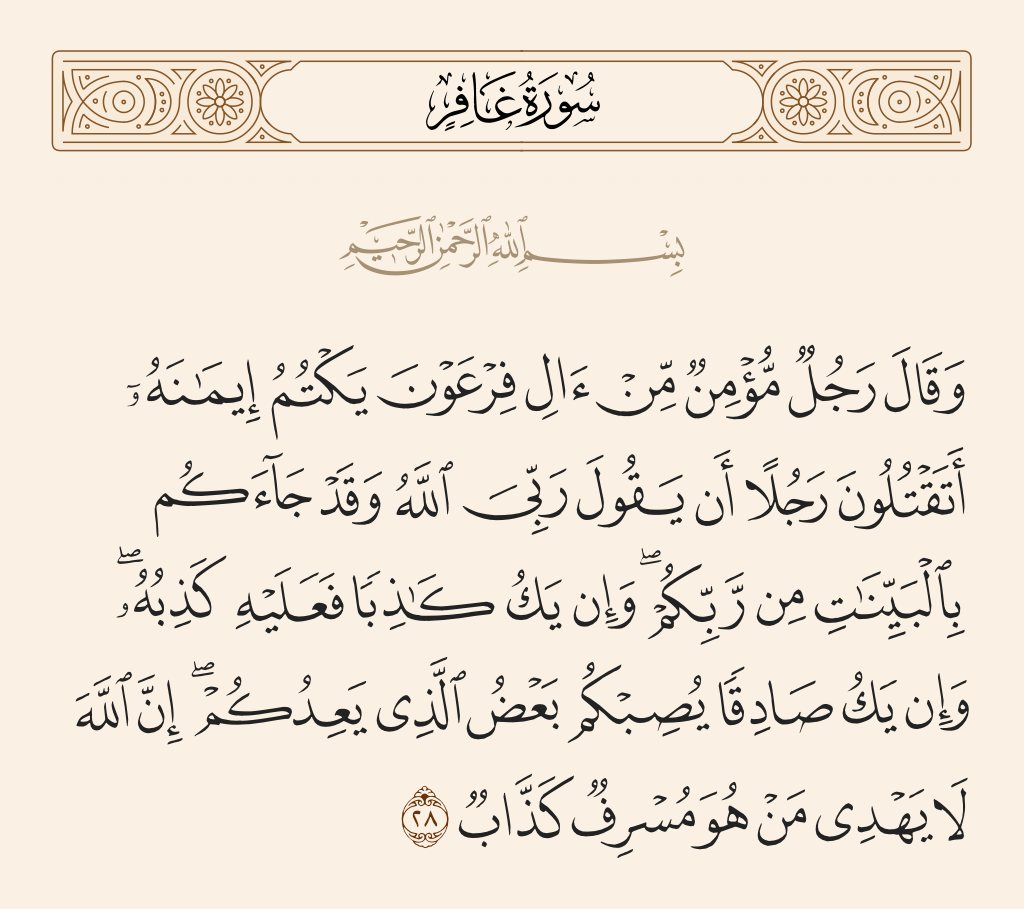Surat Ghafir Verse No. 28: Reading and listening
Translation of the verse 28 from Surah Ghafir : Number of verses 85 - - page 470 - Part 24.

﴾وَقَالَ رَجُلٞ مُّؤۡمِنٞ مِّنۡ ءَالِ فِرۡعَوۡنَ يَكۡتُمُ إِيمَٰنَهُۥٓ أَتَقۡتُلُونَ رَجُلًا أَن يَقُولَ رَبِّيَ ٱللَّهُ وَقَدۡ جَآءَكُم بِٱلۡبَيِّنَٰتِ مِن رَّبِّكُمۡۖ وَإِن يَكُ كَٰذِبٗا فَعَلَيۡهِ كَذِبُهُۥۖ وَإِن يَكُ صَادِقٗا يُصِبۡكُم بَعۡضُ ٱلَّذِي يَعِدُكُمۡۖ إِنَّ ٱللَّهَ لَا يَهۡدِي مَنۡ هُوَ مُسۡرِفٞ كَذَّابٞ ﴿
[ غافر: 28]
And a believing man of Fir'aun's (Pharaoh) family, who hid his faith said: "Would you kill a man because he says: My Lord is Allah, and he has come to you with clear signs (proofs) from your Lord? And if he is a liar, upon him will be (the sin of) his lie; but if he is telling the truth, then some of that (calamity) wherewith he threatens you will befall on you." Verily, Allah guides not one who is a Musrif (a polytheist, or a murderer who shed blood without a right, or those who commit great sins, oppressor, transgressor), a liar!
English - Sahih International
And a believing man from the family of Pharaoh who concealed his faith said, "Do you kill a man [merely] because he says, 'My Lord is Allah' while he has brought you clear proofs from your Lord? And if he should be lying, then upon him is [the consequence of] his lie; but if he should be truthful, there will strike you some of what he promises you. Indeed, Allah does not guide one who is a transgressor and a liar.
Tafheem-ul-Quran by Syed Abu-al-A'la Maududi
(40:28) Then a man endowed with faith, from Pharaoh's folk, who had kept his faith hidden, said: 'Do you kill a person simply because he says: 'My Lord is Allah' even though he brought to you clear Signs from your Lord? *45 If he is a liar, his lying will recoil upon him; *46 but if he is truthful, you will be smitten with some of the awesome consequences of which he warns you. Allah does not guide to the Right Way any who exceeds the limits and is an utter liar. *47
Tafheem-ul-Quran by Syed Abu-al-A'la Maududi
*45) That is, "He has shown such manifest Signs to you as have made it absolutely clear that he is a Messenger sent by your Lord." The Believer, from among the people of Pharaoh, was obviously referring to the Signs the details of which have already been given in AI-A'raf: 107-117,130-133; Bani Isra'il: 101-102; Ta Ha: 56-73; Ash-Shu'ara': 30-51; An-Naml :10-13).
*46) That is, "If in spite of such manifest Signs as he has shown you, you regard him as a liar, you should leave him alone, for the alternative probability, and a very strong probability too, is that he is truthful, and therefore you may involve yourselves in God's torment by laying your hands on him. Therefore, even if you think that he is a liar, you should leave him to himself. For if he is lying, in the name of Allah, Allah Himself will take him to task." Similar words had the Prophet Moses himself said to Pharaoh before this: "If you do not believe in me, do not harm me." (Ad-Dukhan: 21)
Here one should keep in mind that the Believer of the people of Pharaoh had not openly disclosed in the beginning that he had affirmed faith in the Prophet Moses, but he spoke as if he also belonged to Pharaoh's side, and was only wishing his people well. But when Pharaoh and his courtiers did not seem to see reason and continued to behave stubbornly, he at last disclosed the secret of his faith, as becomes obvious from his speech in vv. 38-44.
*47) This sentence can have two meanings and probably the Believer had intentionally employed it, because he did not yet want to express his belief openly. Its one meaning is: "One and the same person cannot combine righteousness and lying and falsehood. You can clearly see that Moses is a man of very sublime and pure character. Therefore, how can you believe that, on the one hand, he should be such a liar as to lay a baseless claim to prophethood in the name of Allah, and on the other, Allah should bless him with such high morals?" The other meaning is: "If you arc bent upon taking the life of Moses (peace be upon him) by transgressing alI limits and will execute your evil designs by bringing false accusations against him, you should remember that Allah will never show you the way to success."